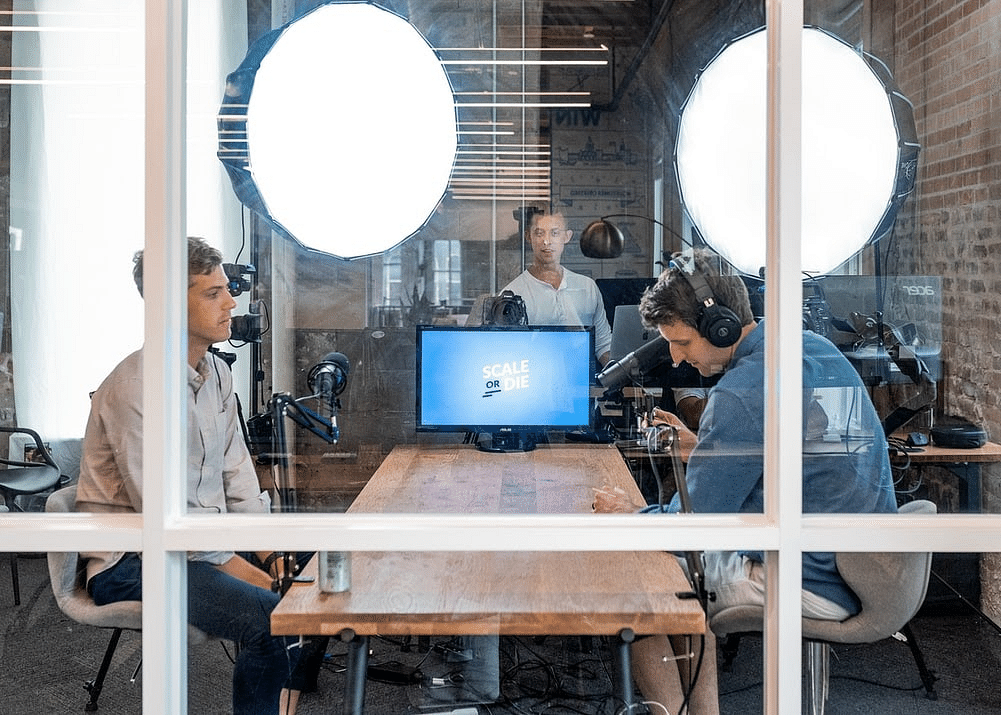
Got access to an industry influencer? Here’s what you should consider before sharing your guest with another podcast host
By Jim James, Founder EASTWEST PR and Host of The UnNoticed Podcast.
If you’re building your brand, should you be a host on someone else’s show or should you be hosting your own show?
An entrepreneur emailed me with a concern: A leading authority in her field would like to be with her on a webinar. However, she’s uncertain if her business should host this event themselves and promote it under their own — or should they work alongside an established industry magazine with a big readership?
For many people building a brand, there’s this question of whether you need to build or borrow a resource. And this includes the audience itself. The answer would be different depending on your circumstances.
To contextualise things, the entrepreneur who asked me has a growing business and is becoming more of an authority in their field. They’ve managed to get somebody interested in being with them on a show and now, they’re debating: Should they host that themselves or partner with a publication that has a show instead? The downside is that the editor of the publication would become a host as well, diluting the entrepreneur’s presence. But on the other side, they could get access to the magazine’s audience.
Weighing Pros and Cons
First of all, it’s a great idea to speak on a podcast, webinar, or radio show. It’s still exposure for you and your brand.
Image from Unsplash
For the entrepreneur’s part, it’s already a good point that they were able to entice another leading figure in their field to discuss a particular issue together. When you host a podcast or write a blog on your own, you’re creating a two-party conversation. However, what’s great about being on someone else’s show is having the opportunity to make it a three-way conversation. It will now involve the industry expert, the magazine editor, and the entrepreneur herself. This will create more dynamics compared to when only one or two people are speaking. The content that will be produced will also be more compelling.
Another point to consider is if they have the capacity to have their own technical setup (e.g., Zoom, Streamyard)? Having the resources to manage and pull off a show isn’t that easy and it takes some work. You have to worry about microphone levels, the stability of your internet connection, and the technology that your other speaker has. You have to think about the content and the production side of it as well.
In the entrepreneur’s case, working alongside an industry magazine with a show would give them the possibility to outsource all of that hard work. But the flip side is that the publication may claim the glory for the whole topic; the editor could muscle in, diminishing the entrepreneur’s chance to talk. And if there will be three speakers, the less that chance would be.
Now, in the case that the publication is already a platform that can host a podcast or a webinar — including the broadcast itself and the post-production work — working with them will be helpful. They’d do a better job especially in terms of editing the long tail of content. This content, which refers to those that you put out after an event, is often more valuable than the event itself. For instance, when you are hosting a webinar and the number of attendees for the webinar is not that great, you can rake in more viewership when you release post-event content. Today, this is where most statistics are coming from.
Things to Consider
According to the entrepreneur, the benefit of working with the magazine is that they will take care of the tech side and increase the potential audience. They’ll also be able to endorse the entrepreneur’s brand because the publication already has a reputation. The downside, for her, is that they won’t get the benefit of being seen as the host and they could be helping further build the brand of the publication, not theirs.
Image from Unsplash
To properly weigh things, you have to consider where are you at in your journey in terms of your own brand. Also, what is the scale of your audience? If you will invite an industry authority to your show and you don’t have an audience that’s commensurate with the level of the resource speaker, that person’s probably going to be disappointed by the impact that your show can create.
When creating a show, putting out content, and doing the post-production, there are different pieces of work that need to be done. All these need a particular skill set. And this is another aspect that you need to take into account. But if you already have the platform and the distribution in place, you can add value to your platform not just by inviting the industry expert but the magazine editor as well.
In the case of the entrepreneur, she’s been running her business now for about a year and they’ve already established connections with people who want to be seen with them. However, they don’t have the platform and the audience yet. What they can do for now is to partner with the publication. This is similar to how it’s done back in the day: A brand would rather write an article and try to get it published in a magazine than launch their own magazine. And in here, it’s not just about your own content — it’s also about the content that surrounds your article or your podcast. You have to think about the context where your piece is going to appear in.
Leveraging Other’s Platform
Now, the question is: How can you leverage other’s platforms for your content? Assuming that they’ve got the platform and the audience, and they’re going to do the distribution and the post-production, what you can do is to bill yourself as the co-host of that particular episode. It’s you who’s making a special appearance on their program.
You should also ask to be included in the show notes and get access to their mailing list. Newsletters and subscription lists should be the value you’re trying to get. Because while podcasting is a great way to show your expertise, the audience won’t have the ability to respond to you immediately. If they would receive an email, they can simply click on reply and get in touch with you.
Apart from these, I also suggested to the entrepreneur that she should be included on the magazine’s website. If there’s an event website, her name should be there as well. The important thing here is to tap all the ways to leverage her own brand before the event.
During the event proper, she could also be tweeting and sharing hashtags relevant to the show. It’s also possible for her to stream on her own platform such as Facebook. She could also record on her own, get clips from it, and share her own snippets. The fact that it’s taking place under another platform doesn’t deny her the ability to build her own brand and content around it. It’s a matter of leveraging their website, their platform, and their subscribers.
Image from Unsplash
Taking the Industry Expert into Account
What if there’s another party involved — as in the case of the entrepreneur wherein she has another speaker with her?
As I previously said, if the speaker is an industry authority, he or she may feel disappointed if he or she would be on a platform with an underwhelming listenership. On the other hand, that speaker may be impressed and grateful if he or she can get access to a podcast that he or she won’t get into on his or her own. Today, many thought leaders are not capable of getting themselves into places where they can be heard.
Part of the role that the entrepreneur is playing is facilitating that access. This in itself can add value to her relationship with the speaker. And it could lead to more opportunities: She could be instrumental for the speaker to get into other platforms. Eventually, she could start charging this service as well, especially if there will be more people who would want to be within her sphere of influence and get them into other shows.
A Mix of Both Worlds
The entrepreneur’s concern started when an industry expert asked to be featured with her. And this gave her the choice of guesting on someone else’s show with the industry expert or starting her own show. If you’re in the same situation, which way should you go?
It really depends on where your business and brand are at. Do you have the infrastructure? Do you have the brand? Do you have the audience and the time to build that out? If yes, then you could leverage that person as a thought leader into your own show. You could also bring another person. For instance, the editor of an industry magazine. You could join your audiences together and share databases so that more people could hear about your conversation. But if you don’t have these resources, there are ways to leverage your presence on another platform. You could still put your content out and get the exposure that you would have gotten have you run the show yourself.
In reality, however, there isn’t one rule. In fact, over time, you’d need to build a portfolio to strengthen your brand. And you would need a mix: For instance, you can be featured on other podcasts together with other thought leaders. Then, your editor can get the audio, repackage it, and put it as content in your podcast. In my case with The UnNoticed Podcast, there are interviews I’ve done with other podcasts that are available on my show.
Keep in mind that making yourself an authority in the market entails collaboration, cooperation, and communication. It may be great to do it all on your own but it could mean that you won’t get the same kind of exposure if you’re appearing on other platforms. However, if you have the resources to carry your own, then you’d also need to use that to build and strengthen your brand. At the end of the day, it’s about needing that mix. Sometimes, it’s best to be on your own. Sometimes, you’ve got to have people use your platform — and you’ve got to use other people’s platforms. There’s no one-size-fits-all solution. In fact, even big names still go on to other platforms, whether it’s television, radio, or podcasting. Because this is how networks are built and maintained. If you won’t expand your network, your brand won’t grow in the same way that it could be if you just connect with other people.
Image from Unsplash
What the entrepreneur who emailed me was doing right is that she has an industry expert at hand. She’s also found a platform to share their conversation with a broader community. One huge advantage of this is that it’s free. It’s going to cost some time but the return will be immeasurable in terms of boosting her brand and building relationships. When you’re speaking on another platform, you can even consider it more valuable to create an elite community of industry authorities than to be able to speak before a wide audience. Having such a community will bring great value to all parties involved.
Solving problems on how to get noticed and heard sometimes require a formula. Sometimes, it’s a process. In the entrepreneur’s case, it’s decision-making weighed up against many factors. If you have concerns like her, send your enquiries at www.eastwestpr.com and I will happily share my experience of over 25 years building brands for companies and myself.
This article is based on a transcript from my Podcast The UnNoticed, you can listen here.
Cover photo by ConvertKit on Unsplash.




